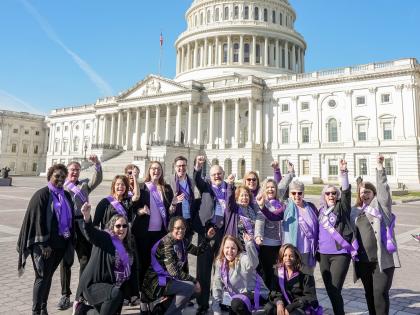Colorado State Alzheimer’s Plan Overview

The Colorado Alzheimer’s Coordinating Council (CACC) was authorized by the state legislature in 2008 with the passage of Senate Bill 08-058. Members included representatives from state agencies, the state legislature, care providers, family caregivers, persons living with the disease, and the Colorado Chapter of the Alzheimer’s Association. Tasked with creating a state plan on Alzheimer’s, the CACC focused on Colorado’s current public and private capacity to address Alzheimer’s, identify service and support gaps, and make recommendations to improve the care of those living with the disease, their caregivers and their families. The Colorado State Alzheimer Disease Plan: A Roadmap for Alzheimer’s Disease Caregiving and Family Support Policies was published in November 2010.
In 2022 through a community-informed process, the Colorado Department of Public Health and Environment and ADRD Advisory Committee released the Colorado Alzheimer's Disease and Related Dementias (ADRD) State Plan. The new State Plan outlines actions for the next five years to enhance risk reduction and early diagnosis, and to improve the lives of persons living with Alzheimer’s and other dementia and their caregivers.
Colorado 2026 Policy Priorities

Establish Licensing Requirements for Memory Care Units
Individuals living with Alzheimer’s and other dementia make up a significant portion of those using long-term care services. They also have needs that often make care delivery challenging and more demanding. For assisted living communities in Colorado that offer memory care units for residents living with dementia, there are no additional licensing requirements that qualify communities to deliver specialized care to these residents, which causes Coloradans to pay more each month for services they may not be receiving. The Alzheimer’s Association is urging state lawmakers to support legislation creating a memory care licensing structure for assisted living communities to ensure a consistent standard of care across the state.
Colorado State Advocacy Day
Join us to advocate for Coloradans impacted by Alzheimer’s disease and other dementia. Advocates will come together and share their stories with state legislators to urge support for our critical policy priorities and improve the lives of people living with Alzheimer’s and other dementia. Don’t miss this chance to make a difference!
Sign Up to Learn About Advocacy Opportunities in Colorado

Find My Chapter
Together, we’re making an impact. Find an Alzheimer’s Association chapter in your community for more ways to engage.
Contact Us
State Affairs Contact: Tory Roberg
Phone: 602.782.3621
Email: troberg@alz.org
90,800
people living with Alzheimer’s in Colorado
178,000
Coloradans are providing unpaid care
$856 Million
Medicaid cost of caring for people living with Alzheimer’s (2025)
162.8%
increase in Alzheimer’s deaths 2000-2022
15%
in hospice with a primary diagnosis of dementia
98.2%
increase of geriatricians in Colorado needed to meet the demand in 2050
Resources to Drive Change in Colorado
The following resources developed by AIM and the Alzheimer’s Association will help you learn more about the issues impacting people living with Alzheimer’s and their caregivers, how Colorado policymakers are addressing these gaps, and how you can help drive change.